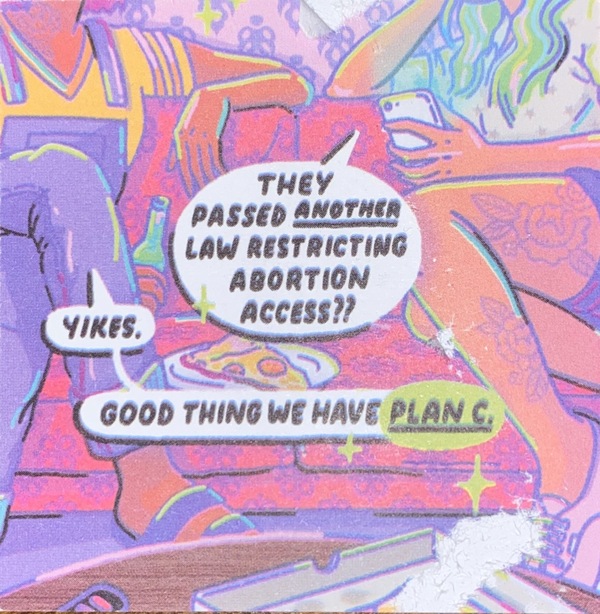
On September 16, 2022, I found a “Plan C” card, carefully taped to the side of a bathroom stall so it was half hidden. From afar it looked innocent enough: a small square card with brightly colored artwork similar to many of the small jokes or posters placed in a girl’s bathroom. But on further examination, this card proposed a dangerous lie. Not only does it lament the pro-life laws sweeping the country in the wake of the Dobbs decision, but it also directed anyone who “need[s] to become un-pregnant” to a website that boldly proclaims the solution: “a safe, at-home abortion.”
There is no such thing as a “safe at-home abortion.” Though the Plan C website asserts that these abortion pills are “safer than taking Tylenol,” by its very nature, abortion is not safe. Not only does the abortion pill take the life of a child, but also puts women at risk for a host of other related mental and physical health issues including the trauma of going through birthing a dead child alone. The promulgation of abortion-by-mail, though, especially on college campuses like Notre Dame’s, necessitates this isolation.
A pregnant student learns of her pregnancy alone. She is scared alone. She finds the Plan C card in a bathroom stall alone. She goes online and can, without any verification by a doctor, order life-threatening drugs from an online pharmacy alone. She takes the doses of mifepristone and misoprostol alone. Plan C’s website told her the abortion would be like a heavy period; she begins bleeding alone. If the pregnancy test she took was wrong, if she wrongly estimated how far along she was, or if hers is an ectopic pregnancy, she could also die alone, bleeding out on the floor of her bathroom or her dorm room.
“These pills are being pushed upon women who are in very vulnerable situations, and because they are already in a situation where they don’t want to be public, they are going to be afraid to reach out for help if and when they experience complications,” said Petra Farrell, Culture of Life Program Manager at the de Nicola Center for Ethics and Culture. “As the mother of a daughter myself, I’m very concerned for the young women who will see these cards and feel like they are utterly alone, when in reality the Notre Dame community is one of love and support for women, babies, and families.”